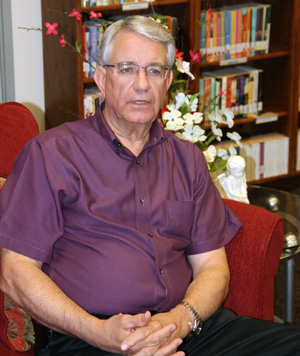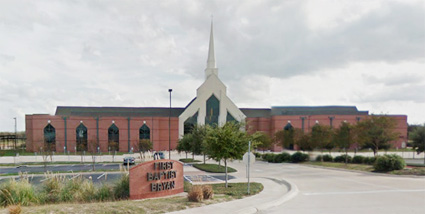Bryan minister sees changes in religious education
BRYAN—While a growing relationship with Christ remains the focus of church-based religious education, Bill Wiman saw significant changes in methods and approaches during more than three decades he invested in the education ministry at First Baptist Church in Bryan.
One of the biggest changes involved the proliferation of Sunday school and discipleship curriculum, said Wiman, who retired as minister of education and administration July 31.
 Bill Wiman, retired July 31 after more than 30 years in religious education ministry at First Baptist Church in Bryan.“Back in the day, it was Life and Work” curriculum from the Baptist Sunday School Board, he recalled. “It was easy to conduct workers’ meetings when you all were teaching the same material. You could model for the teachers how to present the material, and I did that for a number of years.”
Bill Wiman, retired July 31 after more than 30 years in religious education ministry at First Baptist Church in Bryan.“Back in the day, it was Life and Work” curriculum from the Baptist Sunday School Board, he recalled. “It was easy to conduct workers’ meetings when you all were teaching the same material. You could model for the teachers how to present the material, and I did that for a number of years.”
The Bryan church’s 31 Sunday morning Bible fellowships—a change in terminology and approach from traditional Sunday school—employ about a half-dozen curriculum series. It is impossible to conduct a one-size-fits-all teacher-training meeting, he said.
While he admits he first resisted the change from one curriculum, he now sees variety offers some advantages.
“You have people who are in different places and stages in life,” Wiman said. “You also have people who learn differently. So, having different curriculum choices allows them to find the right fit for their group.”
A matter of focus
Sometimes, it is a matter of focus.
“Some want a curriculum that is more application-oriented, others want more biblical content, while still others want popular teachers and authors,” he said. “Some want to study a book of the Bible, and we’ll often use BaptistWay Press for them.”
Each leader decides what matches the needs of his or her group and reports the choice to the church’s education office, which orders curriculum for each Bible fellowship.
Still, with a variety of options, “everybody is not on the same page and studying the same material, so it is hard to drive a focus,” Wiman pointed out.
 When First Baptist Church in Bryan prepared to move to its new location (above) from downtown, Wiman said the congregation wisely increased its debt retirement and avoided a money crunch.Another major change during his time in Bryan was geographical. The congregation moved from a downtown facility to its present location along one of the main traffic arteries in Bryan about eight years ago.
When First Baptist Church in Bryan prepared to move to its new location (above) from downtown, Wiman said the congregation wisely increased its debt retirement and avoided a money crunch.Another major change during his time in Bryan was geographical. The congregation moved from a downtown facility to its present location along one of the main traffic arteries in Bryan about eight years ago.
Wiman identifies a key element that made the relocation successful: The church eliminated much of its debt prior to the move.
Before First Baptist moved, Wiman studied the relocations of several other churches. He noticed a common problem—increased debt required churches to release staff after the move, and that only compounded their problems.
Debt retirement
“We led the church to increase debt retirement consistently over several years as we moved toward relocation,” he said. “That gave us the opportunity to be ready to include that in our budget. We moved from $100,000 to more than $600,000 in debt retirement over four or five years.
“We were paying ourselves that amount of money out of the budget each month. … We ended up having more saved up for debt retirement that was needed to service the loan.
“I feel real good about that because we were ready to take the step when the step came.”
Another change centers on reduction of growth campaigns initiated by the convention.
“I don’t see that emphasis in our day—that intense support from the denomination for growth,” he said.
He acknowledges it began to get harder to get churches to participate.
Increase in discipleship emphasis
“I do, however, see a greater intensity among churches in the matter of discipleship,” he observed. “We have what we call a ‘ministry map,’ which is believe, connect, grow and share. Where are you in that process? Are you a believer but not connected with a church or the fellowship of a small group? Are you growing in your faith? Are you sharing that faith with others?”
Growing as a disciple requires more than participation in a small group, he added.
“A lot of discipleship is on a personal level—your own personal devotion and the spiritual disciplines that you apply to your own life,” he explained. “We find that small groups are a strong help in furthering discipleship and creating a desire for pursuing those disciplines.”
First Baptist in Bryan sponsors numerous small groups. The church provides curriculum for many emphases, and if a group wants to study something not on the approved list, a copy of the material is presented to a layman, who serves as small-group coordinator, for his approval.
Although he has retired from his duties in religious education and administration, Wiman will continue to serve the congregation as a pastoral care associate about three days a week.
“It’s been a good journey,” he said. “God has blessed me with some great relationships with people. One of the joys is seeing a division director you had a hand in enlisting 20 or more years ago still doing a fabulous job.”